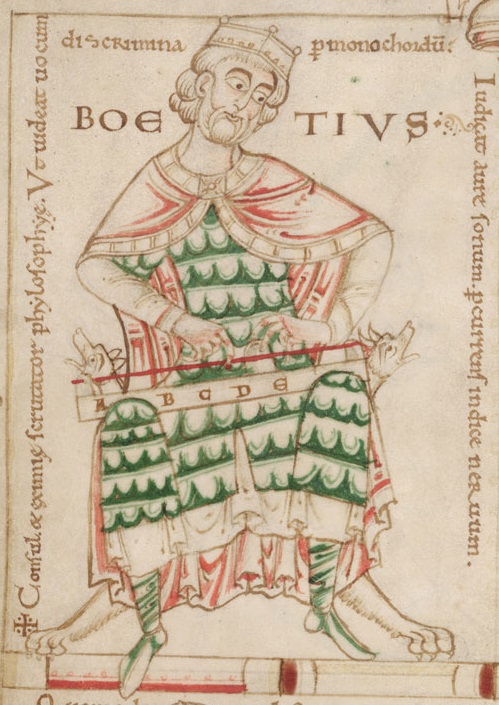
Boethius
Anicius Manlius Severinus Boethius,[6][note 1] commonly known simply as Boethius (/boʊˈiːθiəs/; Latin: Boetius; c. 480–524 AD), was a Roman senator, consul, magister officiorum, polymath, historian, and philosopher of the Early Middle Ages. He was a central figure in the translation of the Greek classics into Latin, a precursor to the Scholastic movement, and, along with Cassiodorus, one of the two leading Christian scholars of the 6th century.[9] The local cult of Boethius in the Diocese of Pavia was sanctioned by the Sacred Congregation of Rites in 1883, confirming the diocese's custom of honouring him on the 23 October.[10]
For other people named Boethius, see Boethius (disambiguation).
Boethius
Boethius was born in Rome a few years after the collapse of the Western Roman Empire. A member of the Anicii family, he was orphaned following the family's sudden decline and was raised by Quintus Aurelius Memmius Symmachus, a later consul. After mastering both Latin and Greek in his youth, Boethius rose to prominence as a statesman during the Ostrogothic Kingdom, becoming a senator by age 25, a consul by age 33, and later chosen as a personal advisor to Theodoric the Great.
In seeking to reconcile the teachings of Plato and Aristotle with Christian theology, Boethius sought to translate the entirety of the Greek classics for Western scholars. He published numerous transcriptions and commentaries of the works of Nicomachus, Porphyry, and Cicero, among others, and wrote extensively on matters concerning music, mathematics, and theology. Though his translations were unfinished following an untimely death, it is largely due to them that the works of Aristotle survived into the Renaissance.
Despite his successes as a senior official, Boethius became deeply unpopular among other members of the Ostrogothic court for denouncing the extensive corruption prevalent among other members of government. After publicly defending fellow consul Caecina Albinus from charges of conspiracy, he was imprisoned by Theodoric around the year 523. While jailed Boethius wrote On the Consolation of Philosophy—a philosophical treatise on fortune, death, and other issues—which became one of the most influential and widely reproduced works of the Early Middle Ages. He was tortured and executed in 524,[11] becoming a martyr in the Christian faith by tradition.[note 2][note 3]